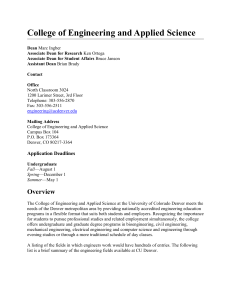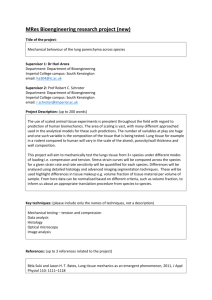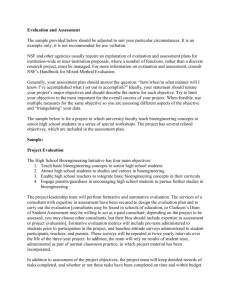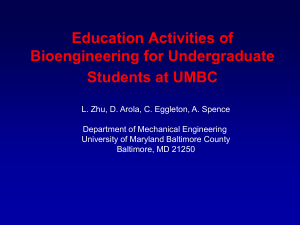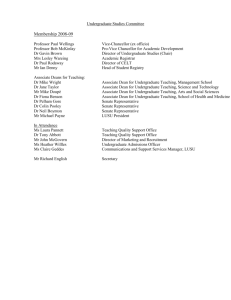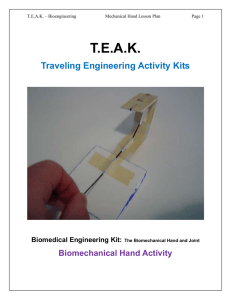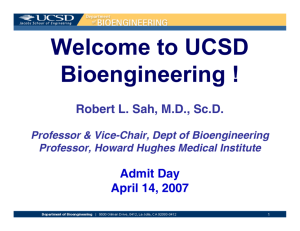NUE: Enhancing Undergraduate Students
advertisement
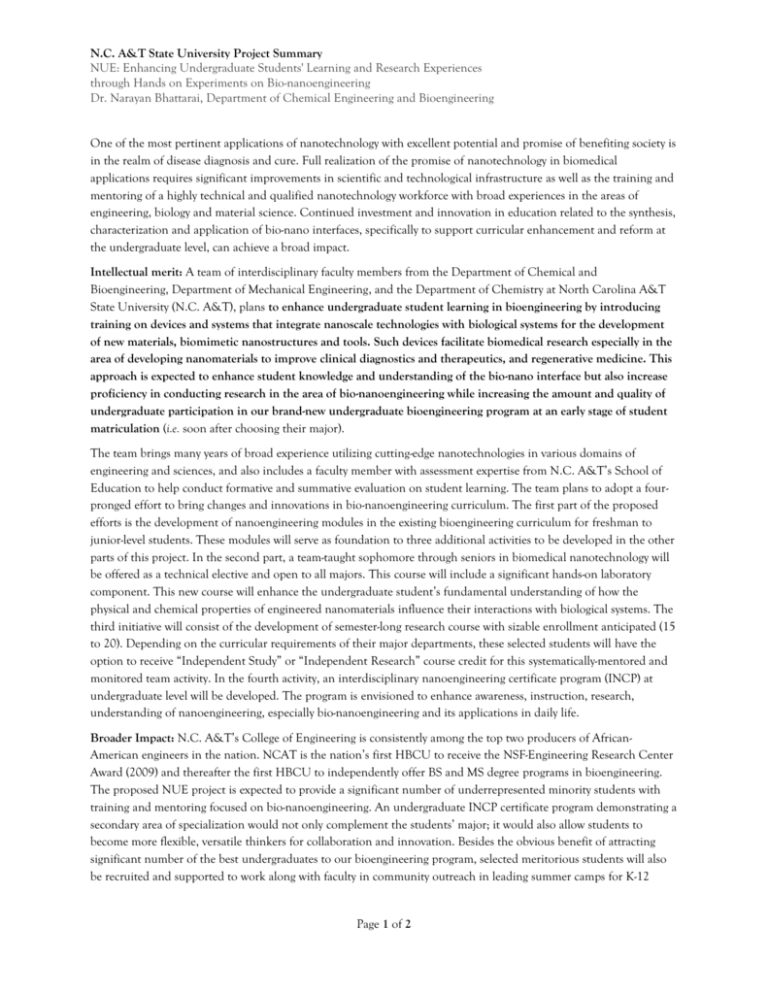
N.C. A&T State University Project Summary NUE: Enhancing Undergraduate Students' Learning and Research Experiences through Hands on Experiments on Bio-nanoengineering Dr. Narayan Bhattarai, Department of Chemical Engineering and Bioengineering One of the most pertinent applications of nanotechnology with excellent potential and promise of benefiting society is in the realm of disease diagnosis and cure. Full realization of the promise of nanotechnology in biomedical applications requires significant improvements in scientific and technological infrastructure as well as the training and mentoring of a highly technical and qualified nanotechnology workforce with broad experiences in the areas of engineering, biology and material science. Continued investment and innovation in education related to the synthesis, characterization and application of bio-nano interfaces, specifically to support curricular enhancement and reform at the undergraduate level, can achieve a broad impact. Intellectual merit: A team of interdisciplinary faculty members from the Department of Chemical and Bioengineering, Department of Mechanical Engineering, and the Department of Chemistry at North Carolina A&T State University (N.C. A&T), plans to enhance undergraduate student learning in bioengineering by introducing training on devices and systems that integrate nanoscale technologies with biological systems for the development of new materials, biomimetic nanostructures and tools. Such devices facilitate biomedical research especially in the area of developing nanomaterials to improve clinical diagnostics and therapeutics, and regenerative medicine. This approach is expected to enhance student knowledge and understanding of the bio-nano interface but also increase proficiency in conducting research in the area of bio-nanoengineering while increasing the amount and quality of undergraduate participation in our brand-new undergraduate bioengineering program at an early stage of student matriculation (i.e. soon after choosing their major). The team brings many years of broad experience utilizing cutting-edge nanotechnologies in various domains of engineering and sciences, and also includes a faculty member with assessment expertise from N.C. A&T’s School of Education to help conduct formative and summative evaluation on student learning. The team plans to adopt a fourpronged effort to bring changes and innovations in bio-nanoengineering curriculum. The first part of the proposed efforts is the development of nanoengineering modules in the existing bioengineering curriculum for freshman to junior-level students. These modules will serve as foundation to three additional activities to be developed in the other parts of this project. In the second part, a team-taught sophomore through seniors in biomedical nanotechnology will be offered as a technical elective and open to all majors. This course will include a significant hands-on laboratory component. This new course will enhance the undergraduate student’s fundamental understanding of how the physical and chemical properties of engineered nanomaterials influence their interactions with biological systems. The third initiative will consist of the development of semester-long research course with sizable enrollment anticipated (15 to 20). Depending on the curricular requirements of their major departments, these selected students will have the option to receive “Independent Study” or “Independent Research” course credit for this systematically-mentored and monitored team activity. In the fourth activity, an interdisciplinary nanoengineering certificate program (INCP) at undergraduate level will be developed. The program is envisioned to enhance awareness, instruction, research, understanding of nanoengineering, especially bio-nanoengineering and its applications in daily life. Broader Impact: N.C. A&T’s College of Engineering is consistently among the top two producers of AfricanAmerican engineers in the nation. NCAT is the nation’s first HBCU to receive the NSF-Engineering Research Center Award (2009) and thereafter the first HBCU to independently offer BS and MS degree programs in bioengineering. The proposed NUE project is expected to provide a significant number of underrepresented minority students with training and mentoring focused on bio-nanoengineering. An undergraduate INCP certificate program demonstrating a secondary area of specialization would not only complement the students’ major; it would also allow students to become more flexible, versatile thinkers for collaboration and innovation. Besides the obvious benefit of attracting significant number of the best undergraduates to our bioengineering program, selected meritorious students will also be recruited and supported to work along with faculty in community outreach in leading summer camps for K-12 Page 1 of 2 N.C. A&T State University Project Summary NUE: Enhancing Undergraduate Students' Learning and Research Experiences through Hands on Experiments on Bio-nanoengineering Dr. Narayan Bhattarai, Department of Chemical Engineering and Bioengineering educators and local school visitations to help increase underrepresented minority participation in the STEM enterprise. Further the undergraduate students impacted by these initiatives are expected to add to the talent pool for N.C. A&T’s graduate programs in traditional as well as in nontraditional engineering and science disciplines such as Bioengineering, Nanoscience and Nanoengineering, and Computational Science and Engineering. Page 2 of 2
